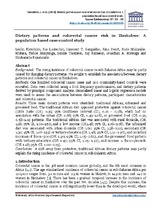Dietary patterns and colorectal cancer risk in Zimbabwe: A population based case-control study
Date
2018Author
Katsidzira, Leolin
Laubscher, Ria
Gangaidzo, Innocent T.
Swart, Rina
Makunike-Mutasa, Rudo
Manyanga, Tadios
Thomson, Sandie
Ramesar, Raj
Matenga, Jonathan A.
Rusakaniko, Simbarashe
Metadata
Show full item recordAbstract
BACKGROUND: The rising incidence of colorectal cancer in sub-Saharan Africa may be partly caused by changing dietary patterns. We sought to establish the association between dietary patterns and colorectal cancer in Zimbabwe.
METHODS: One hundred colorectal cancer cases and 200 community-based controls were recruited. Data were collected using a food frequency questionnaire, and dietary patterns derived by principal component analysis. Generalised linear and logistic regression models were used to assess the associations between dietary patterns, participant characteristics and colorectal cancer.
RESULTS: Three main dietary patterns were identified: traditional African, urbanised and processed food. The traditional African diet appeared protective against colorectal cancer (Odds Ratio (OR) 0.35; 95% Confidence Interval (CI), 0.21 – 0.58), which had no association with the urban (OR 0.68; 95% CI, 0.43–1.08), or processed food (OR 0.91; 0.58–1.41) patterns. The traditional African diet was associated with rural domicile, (OR 1.26; 95% CI, 1.00–1.59), and a low income (OR1.48; 95% CI, 1.06–2.08). The urbanised diet was associated with urban domicile (OR 1.70; 95% CI, 1.38–2.10), secondary (OR 1.30; 95% CI, 1.07–1.59) or tertiary education (OR 1.48; 95% CI, 1.11–1.97), and monthly incomes of $201–500 (OR 1.30; 95% CI, 1.05–1.62), and the processed food pattern with tertiary education (OR 1.42; 95% CI, 1.05–1.92), and income > $1000/month (OR 1.48; 95% CI, 1.02–2.15).
CONCLUSION: A shift away from protective, traditional African dietary patterns may partly explain the rising incidence of colorectal cancer in sub-Saharan Africa.

